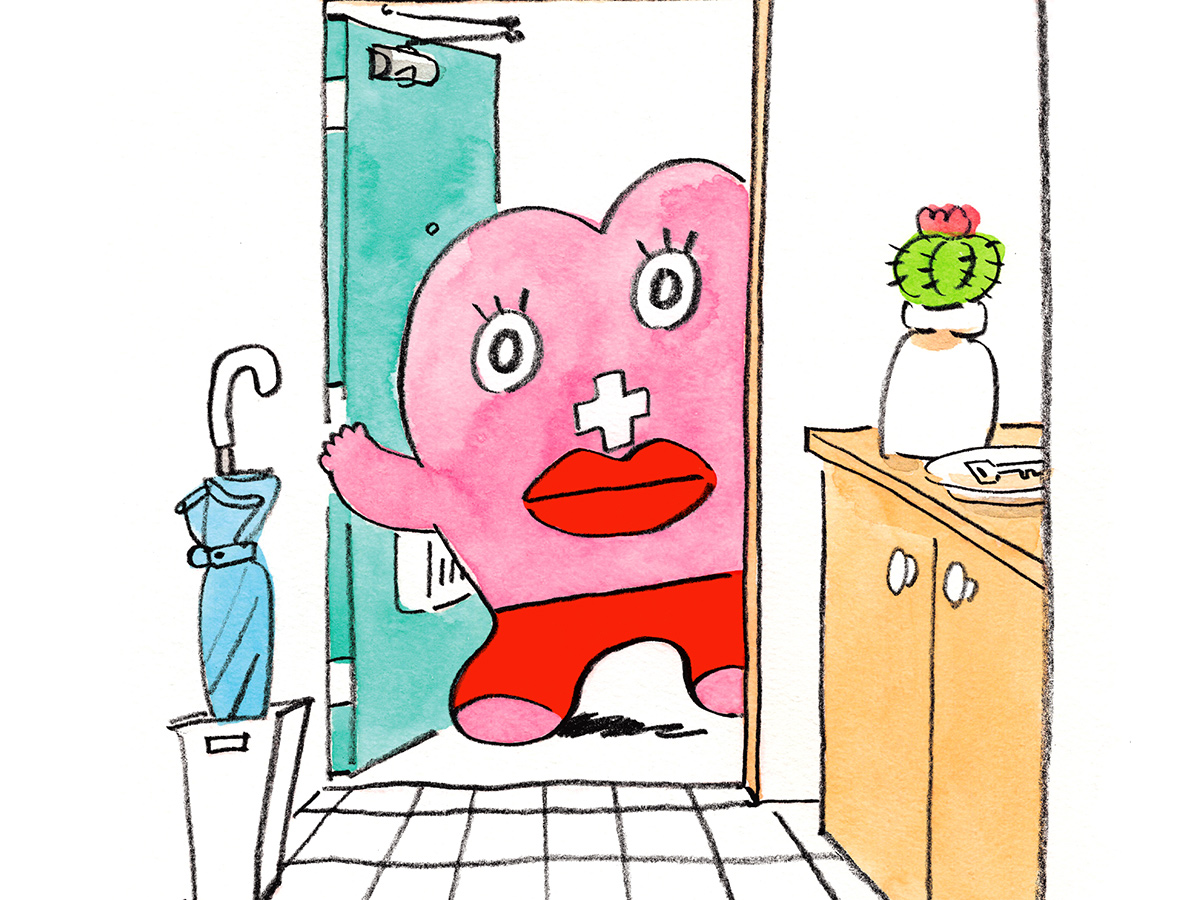- Tags:
- Kawaii / Manga / Mascot / Seiri-chan / women's issues
Related Article
-

Manga artist illustrates morning scene of policemen following old man biking, warms Twitter’s heart
-

New DBZ Cushion From Japan Imagines Frieza As Your “Ideal Boss”
-

Thank You Mart launches lineup of goods of Dragon Ball characters in casual clothing
-

Japanese Manga Artists and Illustrators Welcome 2019 With Awesome Original Cards
-

Manga trans. system Mantra Engine combats piracy, produces Eng. ver. of “Kengan Omega,” others
-

Ten Japanese Illustrators and Painters To Watch



Close encounter of the kawaii kind
Standing on a crowded train, I feel a jostle at my side. An older lady is fumbling through her purse. After another quick jab, she pulls out a smartphone encased in an over-sized cat-like mold. It’s a grotesquely cute attachment that looks like it was won from a carnival kiosk. It’s without a doubt a pop-culture character I don’t recognize. For me, it’s too much, especially for someone her age. I scan the train, but I am the only passenger who seems to notice.
Just in case this is your first time on the internet, cute is perennially en vogue in Japan. It’s understandably a facet of anime culture with varying degrees of eroticism in some circles. But the compulsion extends into arenas unexpected by foreigners. Real-estate agencies, beach cleanup initiatives, public baths, almost anything that can bare branding is associated with a fluffy, hug-able mascot. Check out Shinobi-chan, the kickass pink ninja who claims accounting is cool. Or Susaki city’s Shinjo-kun, the ramen-obsessed otter recently featured on John Oliver. Although it may seem comical at first, it’s kind of an endearing phenomenon once you get used to it.
Introducing Seiri-chan
So, I guess the human experience needs similar anthropomorphizing. Seiri-chan (aka Little Miss P) and her “sidekick” seiyoku-kun (Mr. Libido) are just that, the real-life representations of a menstrual cycle and the male sex-drive. Mr. Libido is a phallic character with a dirty mind and obtuse timing. Just like in real life, he’s a distraction to the male characters in the series.
The focus, however, is entirely on Seiri-chan. “She comes once a month” the manga series warns in a 1950s horror noir forebode. In the serial, Seiri-chan, a pink, fluffy, heart-shaped dynamo stands up for the female protagonists she visits. She lightens heavy moods as well, helping one character deal with a pregnancy scare.
But there is an interesting twist to the series: the author is a man. Ken Koyama is an online manga artist who’s worked on several projects. For fans, Koyama has done his homework. Seiri-Chan’s adventures are true-to-life stories that don’t come off as pandering or mansplaining. According to readers, the manga even contains coping methods and helpful hints. It also helps that Seiri-chan has no patience for unsympathetic men, punching one in the stomach and compelling him to experience a period in one installation. Yet, in Japan, a country often accused of patriarchal tendencies, is this situation warranted? Is it even appropriate for a male author to pen this retrospective piece?
Background
For women’s rights activists, there were some heavy headlines in the last few years. In 2017, journalist and filmmaker Shiori Ito accused Noriyuki Yamaguchi, a prominent journalist with close ties to Prime Minister Abe, of rape. Several articles also highlighted instances of workplace harassment and unequal treatment of female employees. Just last month, Twitter exploded after reports a glasses ban has been imposed upon some female workers—and not their male colleagues. The hashtag #glassesban trended, and many internauts were forced to call out the hypocrisy.
And the faint of heart shouldn’t dig any deeper. Maternity-leave harassment and inadequate childcare are pervasive problems. Abortion clinics are lacking and the father’s consent is required. Historically, permissive attitudes towards sexual assault and victim-blaming were common problems. Needless to say, there’s a lot to talk about.
The Seiri-chan badge incident
Seiri-chan, herself, isn’t free from controversy. An Osaka department store came under fire last month over its planned use of menstrual badges. The badges were worn by female staff during their period. Seiri-chan was pictured on one side, and an advert for the company’s female wellness products was featured on the other. Such a policy is hard to understand from a Western standpoint, or any standpoint and the backlash was notably severe.
A cultural sidenote may be appropriate. Saying appearance is important in Japan would be an understatement. Uniforms are happily worn by most employees and students, and pseudo-uniforms, stereotypical clothing not required but worn to shown intent or purpose, is worn in many situations. It’s important to look the part in this society. Furthermore, commuters often wear badges denoting their health or pregnancy status.
But how was such an unpopular policy decision reached? According to a department store executive, the period-badges were not compulsory and were meant to provide support for female employees. Nevertheless, the policy decision was widely criticized. Customers and staff reported feeling uncomfortable, online reactions were scathing, and public outcry was venomous. Understandably, the managers of the Osaka department store were forced to reconsider the policy.
A mascot with a mission
Despite the controversy, Seiri-chan appears to be OK. Although her series is only a few years old, she has received a massive amount of online attention. The manga is popular and its creator is certainly benefiting from the trend. Seiri-Chan hit the silver screen last month to positive reviews. The series also received the Tezuma Osaka Cultural Prize in 2019.
So if she survives the current controversy she finds herself in, which she likely will, there is without a doubt a future for the hard-hitting mascot. After all, she seems to serve a role in raising awareness of female issues. In this light, perhaps a Mr. Libido sequel makes sense. And, who knows, maybe a Mr. Libido badge for male retail workers? That won’t make anyone uncomfortable at all.
For more information on Seiri-chan, see the following links: